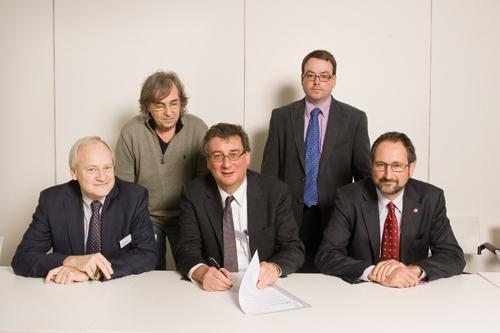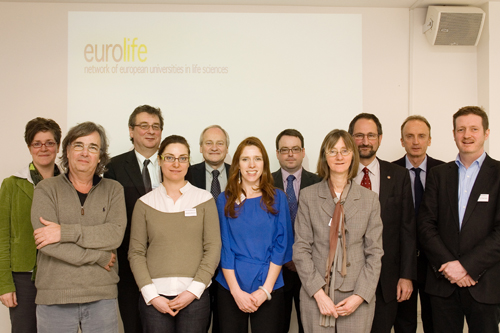The Eurolife International Health Alliance to Fight Against Poverty Related Diseases
Posted on: 01 March 2010
The Eurolife Network of European Universities in Life Sciences announced an important new initiative today (March 1st) in the fight against poverty related diseases – the Eurolife International Health Alliance (EIHA). This brings together the expertise of seven of Europe’s leading universities in an alliance aimed at promoting improved health for the most under-privileged around the world. Eurolife partners have officially endorsed the policy objective of the international health alliance, which will now inform the strategic objectives of the partners in this important area.
Much of the disease burden facing developing communities around the world are avoidable and the goal of EIHA is to provide a leadership role in reducing the incidence of such diseases. The seven universities of Eurolife are uniquely positioned to make a significant contribution to reducing poverty related disease, given their expertise in health science research and education, care delivery, policy research and health economics.

Front Row: Prof Eduard Klasen; Prof Dermot Kelleher; Dr Miles Davies;
Back Row: Prof Albert Tauler; Prof David Argyle.
Eurolife International Health Alliance Objectives
The objectives of the Eurolife International Health Alliance are to develop innovative solutions for tackling poverty related health deficits by using our strengths in
– Education and Training
– Research
– Health Care Policy
– Health Care Delivery
A key feature of EIHA policy will be in building local capacity to deal with international health issues in less developed nations, by investing in training and education and in infrastructure.
This joint commitment of Eurolife to improving international health can be a force for change at both national and European levels. “By bringing together the wealth of experience and expertise present in Eurolife, we can offer creative solutions and implement them where they are most needed,” says Professor Dermot Kelleher, Vice Provost of Medical Affairs at Trinity College Dublin, Chairperson of Eurolife. “This is an immensely important area which has been highlighted by our respective governments where innovative solutions need to be realised. We aim to drive the debate about how we can better meet the needs of less developed communities and empower them to grasp the opportunity for improved health and living standards. Our real strength lies in our unity of purpose – thus we can present a common approach at both the National and European level. However it also gives us critical mass to interact with other key international health initiatives in the US and around the world”.
Professor Nuria Casamitjana, of the Universitat de Barcelona and Centre for International Health Research (CRESIB, Hospital Clínic – Universitat de Barcelona) emphasised the scale of the problem and the need for cooperation to effect change. “Without significant investment in these areas, the problems will get worse rather than better; the fight against the global burden of malaria, pneumonia, HIV/AIDs, tuberculosis and other neglected diseases requires adequate resources allocation and strengthening of health systems and policies in endemic countries; the good news is that this can be arrested and reversed but the scale of the problem requires that we pool high resources and work together”.
Mission Statement
“The Eurolife International Health Alliance (EIHA) will combine its complimentary expertise in International Health to deliver innovative transnational, interdisciplinary education and research programmes in health, health care policy and care delivery that best serve the needs of the developing world. EIHA will utilise its resources to champion International Health as a key priority for improving the health of the human population and will actively engage with policy makers to ensure the realisation of this vision”.
Resources in Place
Eurolife partners already have significant programmes in the area of International Health. for example the Barcelona Centre for International Health Research (CRESIB, Hospital Clínic – Universitat de Barcelona), The Centre for International Public Health Policy in Edinburgh, The Karolinska Institutet Centre for Global Health, the Trinity International Development Initiative, the Center of Infectious Diseases of the Leiden University Medical Center, The Goettingen University Medical Centre DAAD Physician Programme, the Strasbourg Institute of Parasitology, all have research and/or training programmes on poverty related diseases. This is allied to extensive linkages in the developing world, with partner institutions in Africa, Asia and Latin America.
“This Alliance represents an exciting new development with the potential to deliver real changes at both the policy and research levels” stated Dr. Ross McManus, Chairperson of the EIHA. “Our immediate aim is to develop innovative trans-national research, education and training projects. We will cooperate with others of like mind to place International Health at the top of the agenda and contribute forcefully in the delivery of capacity building in the international aid area”.

(L_R): Jacqueline Ton, Leiden University Medical Centre; Prof Albert Tauler, University of Barcelona; Prof Dermot Kelleher, Head of the Medical School and Eurolife Chairman, Trinity College Dublin; Anna Massaneda, University of Barcelona; Prof Eduard Klasen, Dean, Leiden University Medical Centre; Sheila Walshe, Eurolife Administrator, Trinity College Dublin; Prof David Argyle, Head of Postgraduate Research, College of Medicine and Veterinary Medicine, University of Edinburgh; Dr Oonagh Kinsman, Trinity College Dublin; Dr Miles Davies, Karolinska Institutet, Stockholm; Paul McGuire, College of Medicine and Veterinary Medicine, University of Edinburgh; Dr Ross McManus, Trinity College Dublin.
